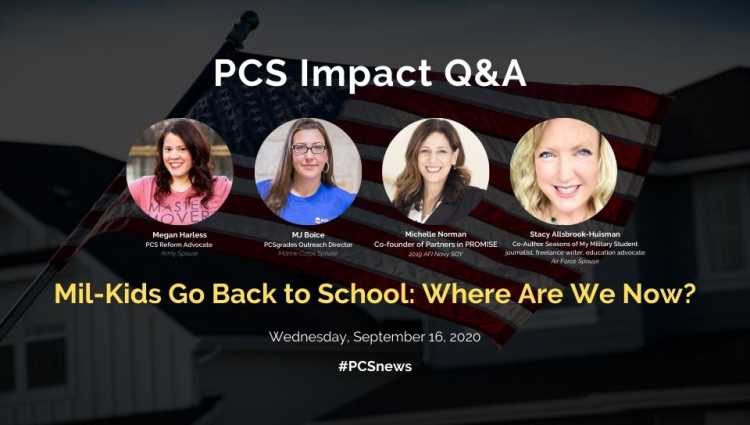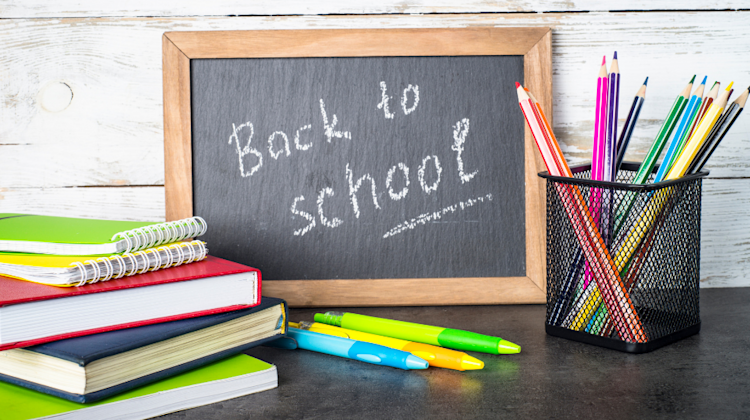PCS Q&A: Mil-Kids Go Back to School: Where Are We Now?
by Lizann Lightfoot - September 16th, 2020

Our guests this week:
Michelle Norman: I’m the Executive Director of Partners in Promise. Our mission is to educate, advise, and advocate for military families with special needs children. Our goal is to remove educational hurdles so service members can serve without worrying about education.
Stacy Allsbrook-Huisman: I am a writer and a journalist in education. I have been writing about military kids and public education for over a decade. We just PCSed through the pandemic, so I’m living the life. I wrote a book called Seasons of My Military Student with my co-author Dr. Amanda Trimilloos. We wanted a reference guide to help families and students changing schools during a PCS.
DOD PCS updates:
DPS has many issues for filing claims right now. TRANSCOM is aware of the issue and trouble-shooting it. They said you are more likely to get access through a government computer. They are trying to correct this, but if you have trouble reach out to your local transportation office and TSP so you can get an extension on your claim if needed.
Don’t forget about the Customer Satisfaction Survey after your move! You can fill it out on DPS or by calling the Help Desk. This helps TRANSCOM know if there were issues and what they were so they can figure out how to improve the system for next year.
Stacy, what have you been hearing from military families? What trends or issues are you noticing?
I’ll start with this: education is state-run. Every state has its own rules and implementations about virtual, hybrid, and in-person education. Everybody is new to this, so suddenly we are all on an equal playing field. Military families transitioning into a new district find that everyone is all navigating new things at once. But transitioning families are surviving but not thriving, because there are no connections to help tether a student into a new community. I think many families are grieving for that process. Parents and teachers are all concerned about kids not thriving in this environment. I think things can only get better, and military families are doing better than many other families because there are other parts of the population struggling more. True friendships need multiple points of contact, so it will take a long time to develop deeper relationships. On the other side of this pandemic, I think military kids will be a unique demographic struggling with mental health and lack of services.
And Michelle, what have you been hearing from families of special needs students? What trends or issues are you noticing?
Let’s go back to March, at the beginning of this pandemic. Military families were very understanding and patient because we are used to this type of turmoil. And we were comforted when the Secretary of Education affirmed that all children have a right to free and equal education. Pete Wright of Wright’s Law conducted a survey to determine that 69% of families requiring special needs actually received education. This echoed what Blue Star Families determined: 31% of families were concerned about IEP (Individualized Education Plan) compliance. It’s not as easy for special education kids to catch up.
EFMP families are now starting a new year and trying to figure things out, but patience is wearing thin. Expectations are there for schools to have a plan and put something into action. Families are trying to make decisions in a difficult environment with limited communication, so many parents are pulling their kids and trying to homeschool. But this isn’t realistic for all families. Others are holding on for the light at the end of the tunnel, hoping they can return in person soon. Some families with older students or anxiety issues are doing fine and thriving in the home environment. I do think there will be long-term consequences, especially since we aren’t doing any benchmark testing.
Stacy, how have school closings in the previous academic year impacted military kids beginning school in a new state this year?
One fo the things that I advocate for is making sure you exit healthy and whole from a school district, so you can translate and transfer to a new school district. During the pandemic, doors closed and staff shut down, so many families transferred without records. With no access to the building, you can get waivers, so placements may not be on par. There were no standardized tests, so students will not be able to change levels. It will be a very stagnant, sustained year. Growth and improved services are not happening. I encourage families to get a teacher-to-teacher letter which is very important when transferring. I encourage families to get a teacher-to-teacher letter which is very important when transferring. Many parents didn't get that continuity in place. It may be another year or so before we understand what kind of backwards slide our students took. Our teachers are amazing, but there isn't a handbook for this. People need to understand that a school cannot fix a community problem like the pandemic. They are simply in reaction mode. Military families are extremely patient, but need to realize that the schools are only reacting to what the community is doing. This was our 9th move in 15 years, and this was the hardest by far.
Michelle, you have 2 school-aged mil-kids; one is attending in-person classes and the other is exclusively virtual at this time. What are some of the challenges you've experienced with this dynamic so far, and how do you mitigate that?
I drink a lot of coffee. There is not enough time in the day for any of this. It was harder in the spring because we were geo-baching and I didn’t have my spouse here. Having him back has lightened the load emotionally. But I’m also on the road a lot now, because our carpool is gone. Everyone picks up their own child, so the pick-up lines are much longer. We did get an expensive N-95 mask for him to go in person because we are afraid for our daughter. She is exclusively virtual. Her school brought in the youngest kids, but I feel like I’m juggling three different platforms and organizing everything. Right now they are motivated, but at the end of spring everyone lost steam and checked out, so I wonder how long they will be able to keep this up.
Stacy, how do we separate the school environment from the home environment when most of our kids are working in the same space?
There’s so many great ideas out there! Moms are crafty and will share great information. For me, it’s important that a kid gets up and goes to school every day. Doing school in bed is not really school. So the first step is to separate home and school for them. But children thrive in routine, so do not throw away routine for them. Routines will prepare them to pivot. As a parent, don’t let them manage this on their own. Their frontal lobes are not developed! They are resilient, but they need help staying focused and motivated. Keep loving them and helping them do what is right.
Remember that for many kids, home is their safe haven from school and the school environment.
Michelle, what kind of questions should parents of special needs students be asking and who should they be asking them to?
We all know someone who has or may have a disability. At Partners in Promise, we believe it is important to communicate with parents and teachers. The first step is the IEP team. But have you met as an IEP team recently? Set up those meetings now, if you haven’t already. As the parent, you are the most educated about how the child handled the pandemic learning environment. Everyone needs to be listening to you. Get those meetings and ask, how has this helped my child? Is this the correct IEP in place right now? What are the levels of performance? Do they need additional services?
There are some addendums floating around about reduced speech service in the schools. We have a checklist on our website to help you organize those thoughts and questions. Do not sign anything if you aren’t fully aware of what your rights are. Your child is supposed to get a free public education. If you have questions about that new language, contact your base legal office or your EFMP office, because they need to know what those documents are. We have resources on the Partners in Promise website, Military One Source, EFMP and ME, and more we will talk about soon.
Stacy, having just PCS'd yourself recently, how are your kiddos fairing so far? What challenges related to COVID and virtual learning have you experienced with them and what are you doing to mitigate those challenges?
I think everyone who recently PCS’d may have a different answer depending what school they went to. Unfortunately, a large part of school is the social side, and without that in place, everything else lands with a thud. This isn’t the schools’ fault, but many kids going through transition are really struggling: there are no social activities, no way to meet teachers, some kids aren’t even turning on cameras. I question how much visual learning the kids can maintain without practice? Especially kids in high school taking AP-level classes.
To mitigate and supplement, you have to know your kid and be involved. If they are struggling, you need to advocate for them. The schools are trying, but that doesn’t mean I have to be quiet. When I see a problem, it’s ok to reach out. Do your due diligence of asking for help. Contact a counselor, look into options and resources and use them. I don’t think much forethought was put into new kids coming into most schools, especially military kids. The new kids are all struggling. These kids are not being connected. Parents need to double down and force connections. Teens and tween aren’t using learning pods and playdates anymore. You can join other parent/mom groups. Cast a very wide net locally to see how they can get involved. Maybe they can try out virtually for a sports team before moving. You may have to go outside your comfort zone and really work hard. It’s challenging, but it will be worth it for your kid. There are still families out there whose service member has been gone since the pandemic, and there is no support for those families– no babysitters, no meetups, no groups.
EFMP families have been struggling with self-care for years, but we really need to take care of ourselves and use resources because we are all maxed out right now.
Michelle, what are some things that parents can do to hold school officials or districts accountable, specifically when it comes to special-needs students?
You need to understand the basics of special education law and get educated on your rights. Go to your state’s website and click on the tabs for special education and military students. Know the Military Interstate Childrens’ Compact Commission (MIC3). Document everything: you need to keep a record of everything. Partners in Promise just created and released a survey for special needs students, so we can gather qualitative data that will help drive change for military families. This helped us create the Promise Act and the NDAA that is going up before Congress right now. We are asking for special education attorneys on the House side, and on the Senate side there is a request for a GAO study to look at funding to do a deep dive. Both versions of the NDAA are wonderful and will give us more tools to help our military families. That’s why this survey is important, because it will drive what we pursue next year. We want to hold onto an IEP for 6 months so there is consistency and routine when a child gets to a new state. That’s how we hold schools accountable: through data, through legislation, and through change. The Navy is starting a pilot program in San Diego and Hampton Roads that will be special education attorneys for military families so that there will be someone local who has the knowledge and can train other JAG officers and School Liason Officers. There is also a new Navy and Air Force EFMP app so you have more options to be educated about your rights and advocate for your child. We have resource partners on our website.
There are 500,000 military families that PCS’d this summer. There are Purple Star schools that are in eleven different states and have gone through some level of professional development. If a school doesn’t know about the MIC3 after all this time, then it’s exhausting for the families who have to fight for their rights. As a parent, you need to print out the Compact and come with it to the school when you are discussing credits and placement for your child. It does need to be expanded and needs more teeth, but it’s a start and some states have it written into their law.
Every time we move, we carry an invisible backpack of stress from all the previous moves when someone has told us “no.” Each move, that backpack gets heavier and more difficult to carry. You need to educate yourself and fight every time, even when it’s exhausting.
Does and IEP last through graduation?
It’s personal choice. The IEP can last throughout education through graduation even up to age 21, depending on the state. If the student is willing and able, they can transition to a 504 plan or even to no accommodation. It doesn’t affect college applications, but if you want accommodation in college, you want to keep those in place and advocate for them to have those in place to take their courses. The pandemic may keep some students in school longer, to make sure they have the schools they need. Check with your state to see the age limit for working on those skills. Not IEPs will not go through to college, but it can be used as a guideline for college accommodations.







